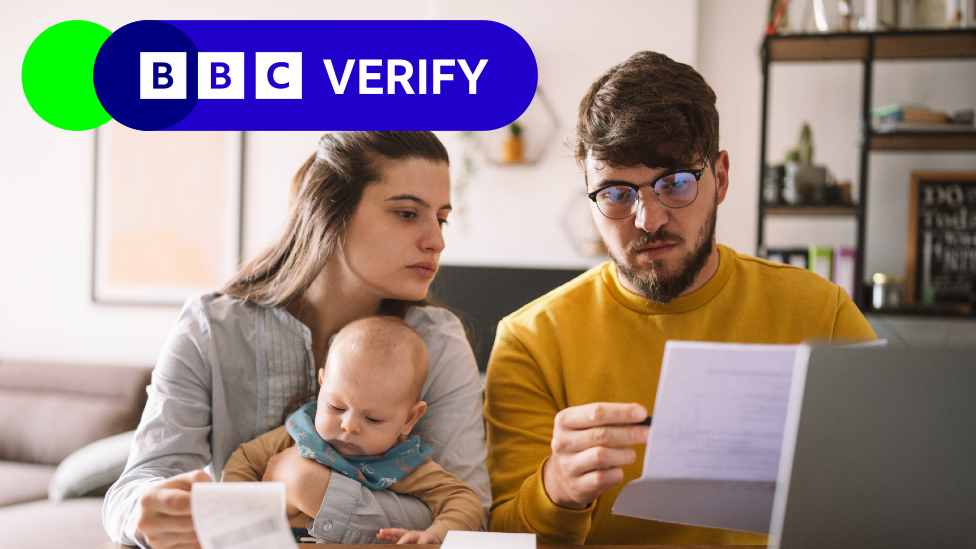Why more parents are losing child benefit
- Published

Ahead of the Budget, some MPs and campaigners have been calling on the chancellor to change the way families lose their child benefit.
Under a policy introduced in 2013, people start losing the benefit once they earn over £50,000 a year.
Since then, rising prices mean the amount you can buy with a £50,000 salary has fallen. This means many more people are being affected by the policy now than when it was introduced.
Like Jason, who is a firefighter and has four children with his partner. He has been awarded a 12% pay rise for last year and this year combined, which means he now earns over £50,000.
He told BBC News that many of his bills had gone up including an extra £200 a month on his mortgage. "I'm now not claiming child benefit and I'm now paying 40% tax on the extra I'm earning, so I am probably a few hundred pounds a month worse off than I was a few months ago," he said.
When do you lose child benefit?
Child benefit, external is paid to families in the UK with children under the age of 16, or under 20 if they are still in types of full-time education or training such as studying for A-levels or Scottish Highers.
You receive £24 a week for one child and £15.90 for each additional child. Those amounts are due to rise to £25.60 and £16.95 a week in April.
If you earn more than £50,000, your child benefit starts being gradually withdrawn, such that if you earn £60,000, you don't receive any child benefit at all.
It means you lose 1% of your child benefit for every extra £100 you earn.
It is only based on the income of one partner. So if two parents earn £50,000 each they still get full child benefit, but if one earns £60,000 and the other isn't working (or they are a single parent) they don't get any child benefit.
And it's up to parents to inform the taxman when they start earning more than £50,000.
If they don't, they can be fined, although the number of fines has fallen considerably, external.
The number peaked at 47,862 in 2015-16 but only 67 people were fined in 2020-21.
You can work out how much of it you may need to pay back via a tax return using this government calculator, external. You can also opt not to receive it in the first place, although that may stop you getting National Insurance credits, external, which count towards your state pension.
What about rising prices?
The £50,000 to £60,000 threshold has not changed since the policy - known as the High Income Child Benefit Charge (HICBC) - was introduced by the then Conservative Chancellor George Osborne in 2013.
If the thresholds had been adjusted in line with rising prices since 2013, you would now start losing child benefit when you earn almost £68,000 and lose it completely from just over £81,000.
Not adjusting the thresholds for inflation means that a lot more taxpayers are now being affected, compared with when the policy was introduced. And it means the government is raising a lot more money.
An estimated 26% of families with children in the UK (around two million households) are now losing some or all of their child benefit, according to an estimate from the economic think tank the Institute for Fiscal Studies , external(IFS) at the end of 2022.
This is double the proportion when the policy was introduced a decade ago. The IFS predicted that if the thresholds keep being frozen this would rise to 31% of households in 2025-26.
We asked the Treasury about the HICBC policy and were told: "The High Income Child Benefit Charge means the government can continue to support the vast majority of families in a sustainable way."
Another frozen threshold
You usually expect thresholds in the tax system to go up each year.
When the thresholds at which people start paying income tax, for example, are not changed it means a considerable tax rise, especially when prices are rising.
And there is a threshold which has been frozen for even longer than the child benefit one.
People don't have to start paying income tax until they earn more than £12,570 a year, which is called the personal allowance.
The personal allowance itself has risen considerably since 2010-11, when it was £6,475.
But since 2010, it has started to be withdrawn at a rate of £1 of allowance for every extra £2 earned above £100,000.
It means those earning more than £100,000 a year start paying tax on part of their earnings they did not previously have to pay tax on.
And that £100,000 threshold has not changed since it was introduced by the then Labour Chancellor Alistair Darling.
If the £100,000 threshold had been increased in line with rising prices since 2010, it would be more than £147,000 today.
The IFS says that 530,000 adults (about 1%) had some of their personal allowance withdrawn in the first year of the policy, which increased to about 1.3 million (2.4% of adults) in 2023.
We asked the government if it was considering changing the threshold given the number of extra taxpayers affected and were told they would not be commenting on future tax policy outside of fiscal events.